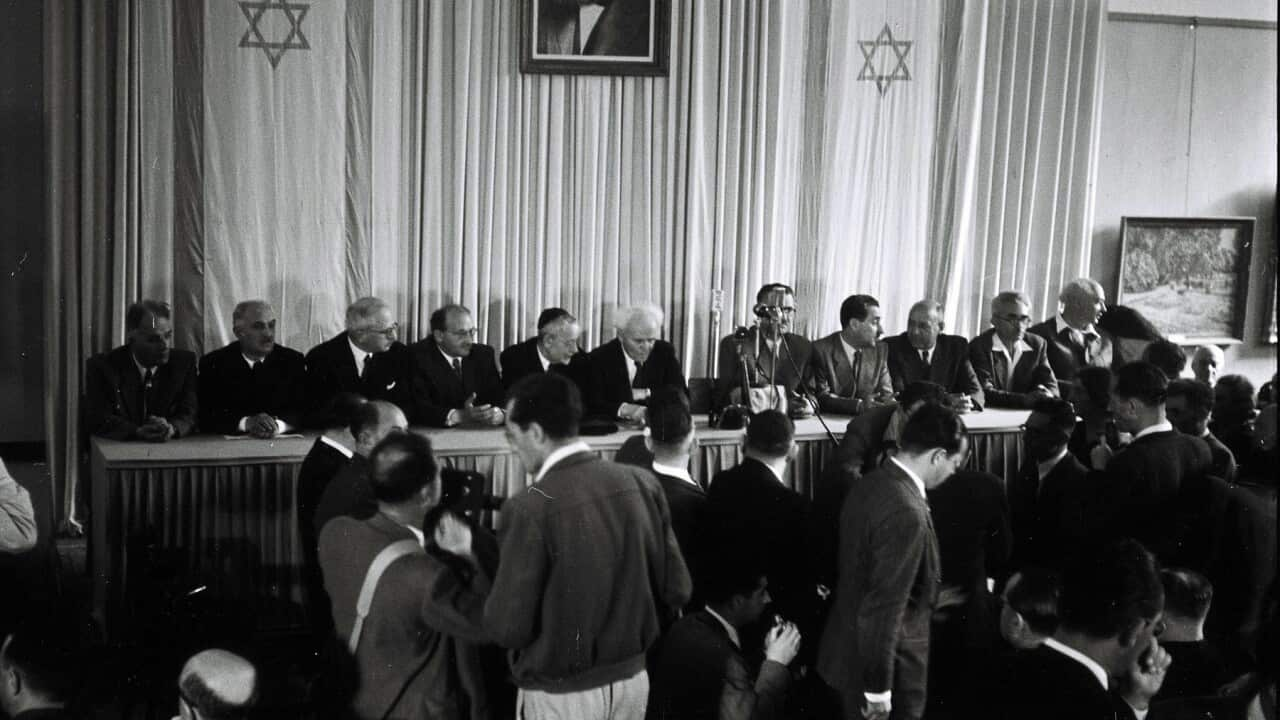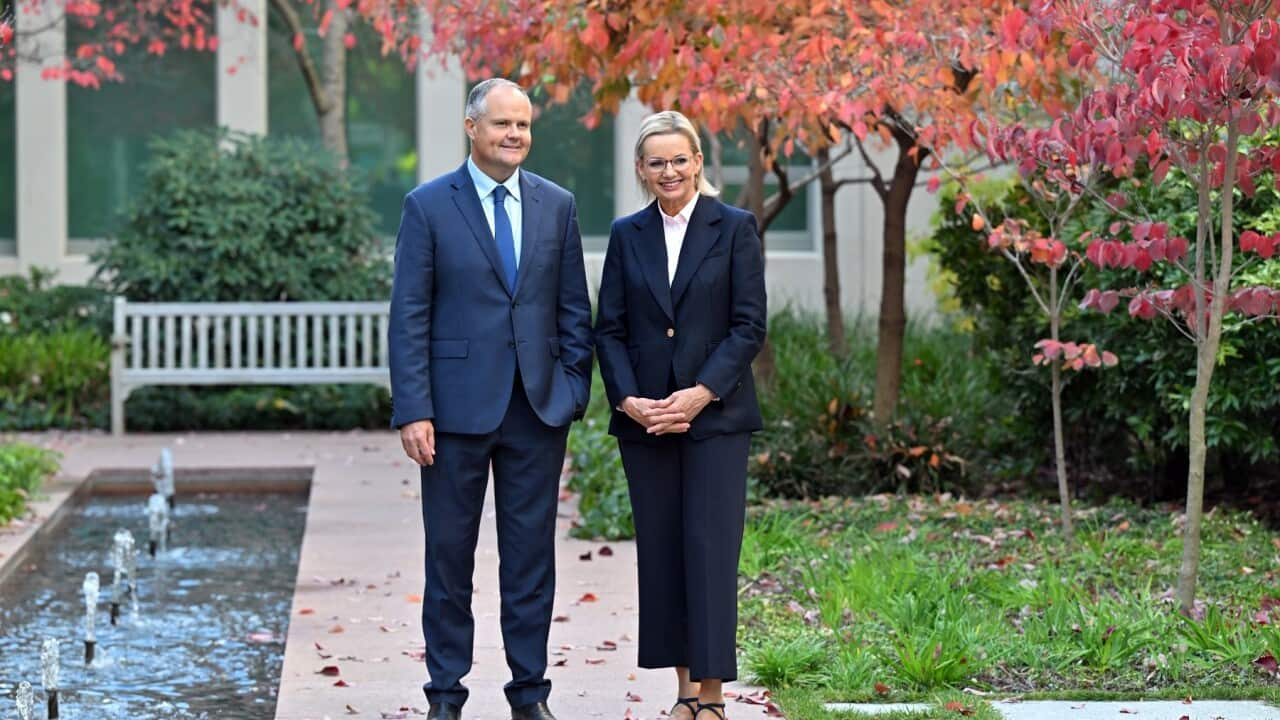TRANSCRIPT
The 1948 Arab-Israeli conflict is a significant turning point in a long and complex history between Israel and Palestine.
But what triggered this escalation in violence, and how do Palestinians and Israelis remember this conflict?
Key to understanding this conflict is the way the Middle East was divided in the early 20th century, following the end of World War One.
The British government took control of what was then called Palestine from 1917 - issuing a mandate to help support the establishment of a national home for the Jewish people.
Dr Martin Kear is a lecturer in International Relations at the University of Sydney, and explains the contradictory promises for Palestinians and Jewish people following the mandate.
"In 1920, there was the San Remo Conference, which basically divided up the Middle East. So Britain had control of Jordan, Iraq, Kuwait, the mandate of Palestine. France had control of Syria and Lebanon. I think if memory serves, there was the Britain was administering the mandate of Palestine on behalf of the League of Nations. And there was a loose view that at some point, indeterminate point, that Palestinians may, if it was deemed, if the Europeans deemed it necessary, have moved towards some form of statehood."]]
But there were competing Jewish and Palestinian religious claims to the land, dating back centuries.
Dr Eyal Mayroz is a Senior Lecturer in Peace and Conflict Studies at the University of Sydney.
"Obviously you have to go back quite a few decades, late 19th century Jews fleeing persecution. In some cases looking for a place where they can protect themselves. Some of them end up in back then Palestine, under Ottoman Rule. I'm saying some of them because many fled to other parts of the world. And this is further inspired by the birth of the, what we call the Zionist movement, the idea that after 2000 years in exile, Jews should go back to Israel or Zion and establish a home for the Jewish people."
Tensions mounted in the 1920s and 1930s as many Jews fled persecution in Europe, strengthening the Zionist movement for a Jewish homeland.
Dr Kear says these tensions escalated as Palestinians responded to the Jewish population's increasing claims to land.
These years are often referred to as the Arab Revolt.
"There was the great uprising from 1936 to 1939 from the Palestinians, I think in response to British efforts to push back and make sure that, well, another commission gave more rights to Jewish communities. That led to the great uprising. The problem for the Palestinians was that as a result of that uprising, any leadership, community leadership was basically either killed or had been pushed outside of the mandate."
Dr Kear says the pressure of the consequences of the Holocaust and a push to decolonise at the end of the Second World War led the UK to hand territorial control over to the United Nations.
"And now there's this big push for the establishment of a state of Israel, and that should be on the mandate of Palestine. The British really had no stomach to push back on that. And there was Jewish terrorist groups that were operating and openly targeting British soldiers. Soldiers were dying. There was bombings in around Jerusalem. And it was for the British. It was like the wars over and these people, we've still have soldiers dying. We can't be asked to do this anymore."
In 1947 the United Nations carved up the territory - giving around 55% of land to the Jewish population and 45% to an Arab contingent - while the highly contested city of Jerusalem was to be governed as a seperate entity by an international regime.
Dr Mayroz says the partition plan was wholeheartedly rejected by Palestinians and the Arab nations.
"A UN committee studies the situation and offers a partition plan in 1947, which is accepted by the Jews to an extent. They say that this is not good, but let's take what we can at the moment, but strongly rejected by the Arab, by Arabs, I mean Arab states, but also the Palestinian leadership on the ground that it is unjust. The division between the two parts is unjust because there were two thirds Palestinians on the land and only one third, but the division was more than 50% of the Jews."
Jewish leaders in Palestine declared an independent state at midnight on the 14th of May, hours before British rule ended - and Israel was recognised by the UN the following year.
Britain officially withdrew and handed control over to the UN on the 15th of May 1948.
That same day, five Arab nations attacked the new state - including Egypt, Jordan, Iraq, Syria and Lebanon.
One of the most significant consequences of this conflict was the mass displacement of over 700,000 Palestinians from their homes, as Dr Kear explains.
He says around 70% of families in Gaza today are refugees - as many fled to Gaza, the West Bank, and neighbouring Arab countries.
[["A lot of families still have the keys to their house that they left. Now, those houses no longer exist. So the Palestinian town would be destroyed and the Jewish town would be reestablished. So it was a destruction. So it was the transference of this state from being, this is now Jewish state, so everything needs to reflect a Jewish state. So there was a lot of destruction, lots of reclamation. It wasn't just the Jewish families moving into Palestinian homes. It was the destruction of those homes in a building of new homes."]]
For Israel, May 15 is celebrated as Independence Day.
Palestinians, meanwhile, mark the start of the conflict as Al-Nakba, to mean the disaster or catastrophe.
"I mean, for the Palestinians, it was, so it's the catastrophe because it really ended any prospects that they had for a state of their own. So there was a lot of animosity that built up for decades prior to 1948. And then that war, Al-Nakba, or the 1947, 48 war just amplified that exponentially where it wasn't just the occasional family, or it wasn't just isolated families being pushed off. It was whole communities."
Dr Mayroz explains why Israel refers to the conflict as the War of Independence.
"I guess in both cases, it's a true description of what took place for the Palestinians. It was a terrible catastrophe that they haven't recovered from since. And for the Jews, it was the establishment of their state. Because for the Israelis, and that's something that is difficult for any outsider to understand, is that for the Jewish people, centuries of persecution and the Holocaust together created this extreme need for a sense of security, and that to a great extent influenced anything that the Jews did or did not do in Palestine and later in Israel."
When a UN-brokered ceasefire took effect on January 7, 1949, Israel controlled 77 percent of the Palestine region, a significant expansion on the 56 percent allocated to the Jewish state in the UN partition plan.
The agreements left Egypt occupying the Gaza Strip, Jordan occupying the West Bank and East Jerusalem, and Israel occupying West Jerusalem.
An Armistice Line was also established along Israel's borders with neighbouring states, which changed drastically following the Six Day War in 1967.
Territories seized by Israel during this war are still considered to be occupied territories under international law - including the Gaza Strip, the Golan Heights and the West Bank, including East Jerusalem.
[[BACK ANNO]]
That story by Catriona Stirrat for SBS News (produced by in-language broadcaster) for SBS News (language group).













